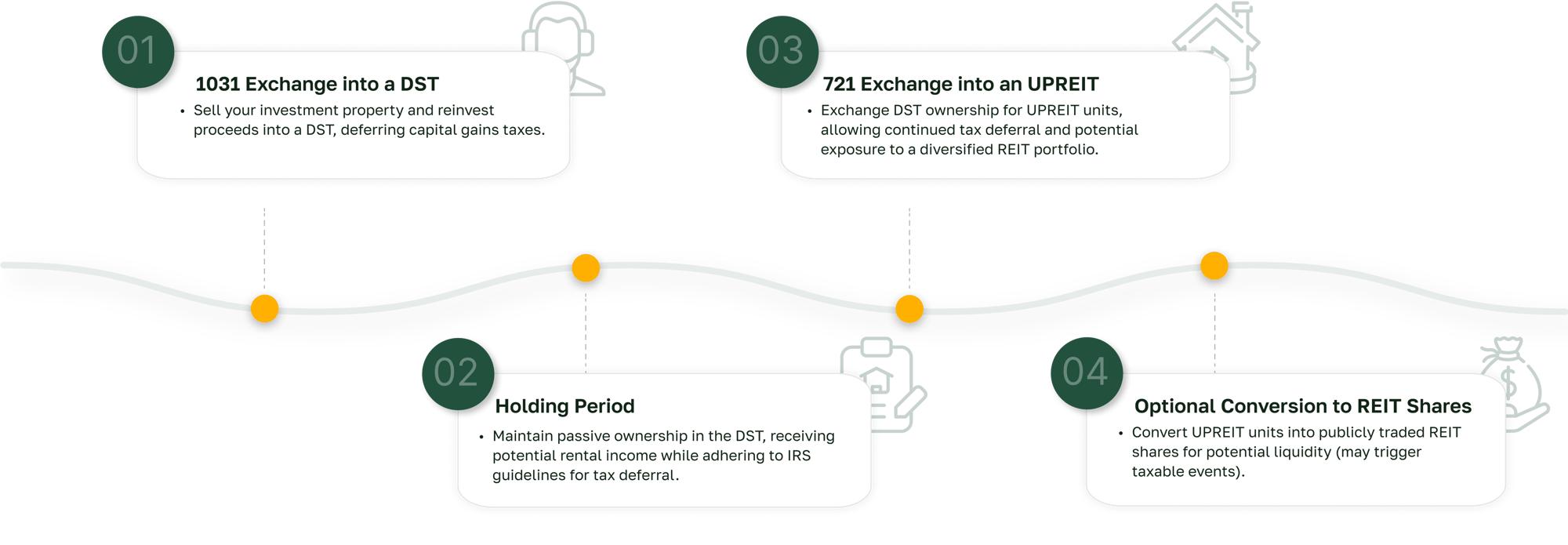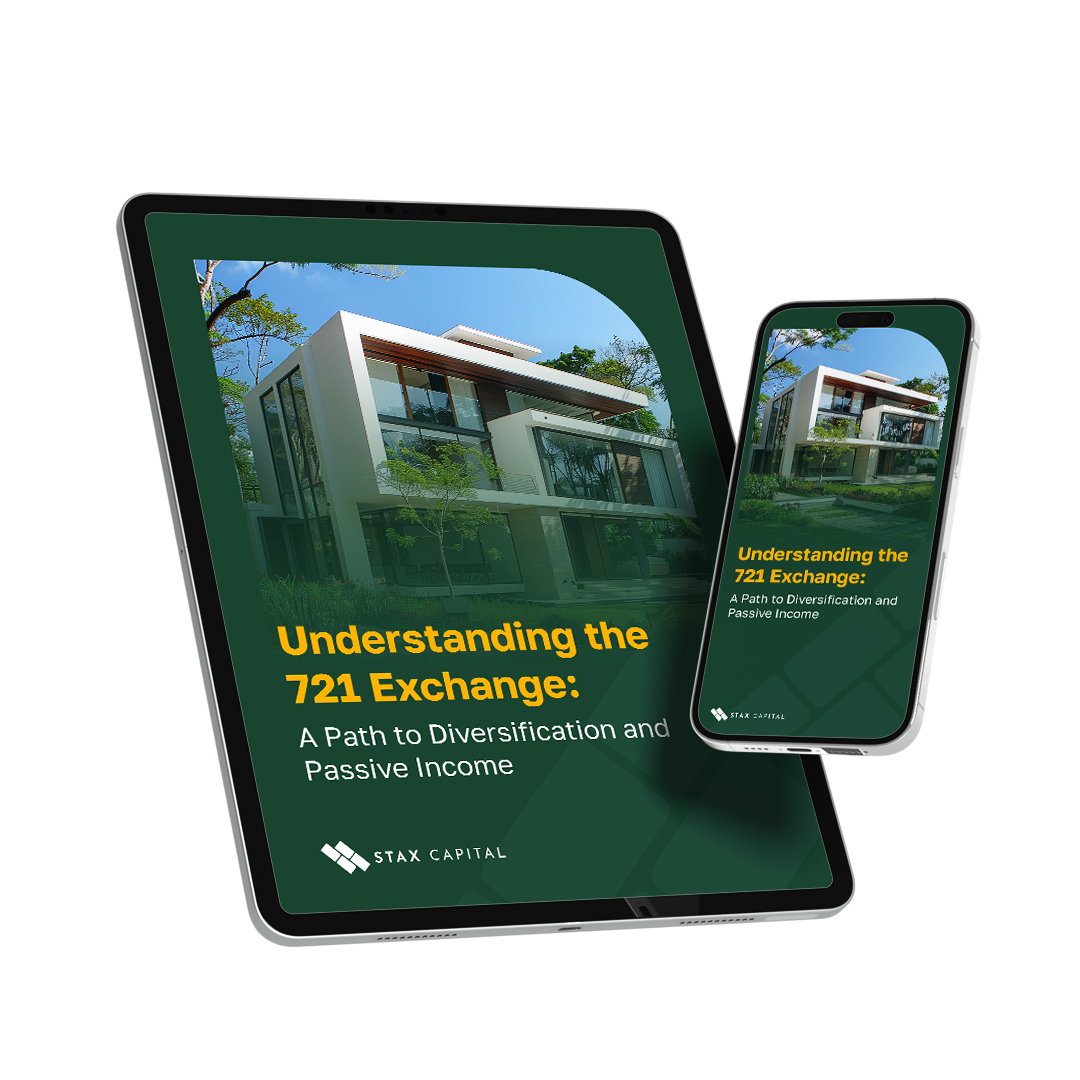721 Exchange
Looking to transition from active property management while keeping your investment working for you? A 721 Exchange allows investors to contribute their real estate holdings to a Real Estate Investment Trust (REIT) tax-deferred, offering potential diversification and income within a professionally managed portfolio.
What is a DST?
A Delaware Statutory Trust (DST) is a legal entity that enables multiple investors to hold fractional ownership in institutional-quality real estate assets. Recognized by the IRS as qualified replacement property for a 1031 Exchange, DSTs offer investors the ability to defer capital gains taxes while maintaining a passive investment approach.
By investing in a DST, real estate owners may diversify their portfolios, gain access to institutional-quality properties, and participate in structured investment opportunities with clearly defined business plans. However, DSTs are illiquid investments, and investors should consult their tax and financial professionals to determine suitability.
What is the 721 UPREIT Strategy?
The 721 UPREIT (Umbrella Partnership Real Estate Investment Trust) strategy enables investors to exchange eligible real estate holdings into a DST followed by an exchange of DST interests for Operating Partnership Units. These OP units may be converted into shares of a publicly traded or private REIT, providing an alternative exit strategy for property owners looking to transition away from direct real estate ownership while deferring capital gains taxes.
This strategy is complex and involves multiple steps, including 1031 Exchanges and DST investments. Investors should work with professionals to ensure compliance and suitability based on their financial goals.

New DST Properties
Gain access to premier commercial real estate investments structured for efficient 1031 tax deferral and truly passive ownership.






BR Churchill Downs DST

- Asset Class: Multi Family
- Minimum: $100000
-
Financial Projections Only login member can access download






BR Amira DST

- Asset Class: Multi Family
- Minimum: $100000
-
Financial Projections Only login member can access download
The 721 UPREIT Process
Think of the DST 721 UPREIT strategy like navigating a maze. You start at the entrance (owning a single property), take a series of turns (exchanges), and aim to reach an exit with more options (liquidity or diversification) while avoiding obstacles (taxes).

Position for Diversity and Added Liquidity
Unlock the potential of real estate investment without the hassle of management responsibilities. Delaware Statutory Trusts (DSTs) offer investors a unique opportunity to own a fractional interest in larger institutional real estate assets properties.
Benefits
Risks
Tax Deferral
By leveraging both 1031 and 721 exchanges, investors can defer capital gains taxes multiple times, allowing them to reinvest more capital into growing their portfolio. This deferral strategy preserves wealth and enhances long-term investment potential.
Diversification
Transitioning from a single property into a DST and eventually into an UPREIT spreads risk across multiple properties and markets. This diversification reduces exposure to local economic downturns or property-specific risks, creating a more balanced real estate investment.
Liquidity Potential
UPREIT units offer more liquidity compared to direct real estate ownership. In some cases, these units can be converted into publicly traded REIT shares, providing investors with potential access to cash without the need to sell real estate assets.
Estate Planning
UPREIT units or REIT shares can be easier to manage in estate planning. These assets may be more straightforward to divide among heirs and could receive a step-up in basis upon inheritance, potentially eliminating deferred tax liabilities for beneficiaries.
Loss of Control
Investors transitioning from direct property ownership to a DST and then an UPREIT surrender decision-making authority. Property management and investment strategies are determined by the trust and REIT sponsors, limiting individual influence over asset performance.
Complexity of Transactions
This strategy involves multiple steps—moving from a 1031 exchange into a DST, then into an UPREIT under Section 721 of the tax code. Due to its complexity, professional guidance is often required to ensure compliance and avoid costly mistakes.
Potential Taxable Events
If not structured properly, certain actions—such as converting UPREIT units into publicly traded REIT shares—can create taxable events. Investors should carefully plan their transactions to minimize unintended tax liabilities.
Dependence on Sponsor Management
The performance of DSTs and UPREITs relies on the expertise and decision-making of the managing sponsors. If the sponsor underperforms or makes unfavorable investment decisions, investor returns may be negatively impacted.
DST 721 UPREIT Guide
Download the resources that suit your needs and start building your wealth through tax-deferred strategies.

721 Insights
Dive into our curated insights to understand the market trends and investment opportunities that keep you informed and prepared for strategic financial decisions.

- 721
What Is a 721 Exchange? Benefits, Risks, and Key Considerations
For many real estate investors, the 1031 exchange has been the go-to strategy for years. But there’s another option on the table that could help you defer taxes and build wealth in a different way—the 721 exchange.
Read More

- 721
721 Exchange vs 1031 Exchange: Which One is Right for You
If you’re looking to defer taxes on your real estate investment, you’ve probably come across the 721 Exchange and the 1031 Exchange. But which one is better for you? These two strategies are powerful tools for real estate investors, but they have their own unique advantages.
Read More

- 721
721 Exchange Pros and Cons: Is It the Right Choice for You?
Selling an investment property can mean a hefty tax bill. But what if there was a way to defer taxes while transitioning into a different real estate investment structure?
Read More
Stax at a Glance
At Stax, our extensive experience and industry partnerships provide access to exclusive private investment opportunities. From 1031 DST exchanges to private equity and credit, we deliver investment strategies backed by some of the industry's most trusted sponsors.
Learn MoreCombined Leadership Experience
35 YEARS
Private Investments Offered Through Stax
$12.3 BILLION
Our Sponsors Assets Under Management
$200 BILLION
Case Stories
Explore firsthand experiences of clients who have successfully transitioned to passive income, built wealth, and diversified their portfolios with our guidance.

Stax made my transition to passive income smooth and stress-free.
Stax helped Shikha complete a 1031 exchange into DSTs, freeing her from property management and allowing her to focus on personal time.
-Shikha

Stax helped me shift to passive income and defer my taxes.
Stax guided Ramesh through a successful 1031 exchange and DST investments, allowing him to defer taxes and enjoy hassle-free income.
-Ramesh

Stax made it easy to switch to passive investments for our retirement.
Stax introduced Sima and Roman to DSTs, allowing them to shift from active property management to a hands-off strategy while maintaining a steady income.
-Sima and Roman
Disclosure
The experiences shared by clients of Stax Capital were given voluntarily without any compensation. These testimonials reflect individual opinions and are not intended as investment advice or guarantees of future results. Each investor should consider their own financial goals, risk comfort, and overall situation before making any investment choices.
Our Partners
Our network of industry-leading partners provides best-in-class investment managers, expert tax advisors, and solution-driven product developers. Together, we deliver exceptional investment solutions tailored to your needs.










Our Leadership Team
Our leadership team combines extensive knowledge of private markets with a shared dedication to putting clients first. We work closely with you, educating you on the pros and cons to ensure the decisions we help you make align with your long-term financial goals.
 Founder & CEO
Founder & CEO
Stacey Morimoto
i Due Diligence and Operations
Due Diligence and Operations
Quinn Morimoto
i Compliance Principal
Compliance Principal
Jason Finley
i
Stacey Morimoto
Mr. Morimoto leverages over 20 years of experience in the securities industry to help his clients navigate the complexities of alternative investments.
After starting his career at Salomon Smith Barney and recognizing the limitations of the traditional wirehouse platform, Stacey became an independent financial representative and established his own securities broker dealer.
Through DST investments, he saw a unique opportunity to deliver real value to clients that larger firms couldn’t offer. The ability to improve the overall day-to-day quality of people’s lives, beyond just their finances, is still what drives him.
With Stax Capital, a boutique firm that prioritizes individual attention, Stacey’s mission is to deliver the best possible educational experience for investors, so that they can make the right decision for themselves.

Quinn Morimoto
Son of founder and CEO Mr. Stacey Morimoto, Quinn has benefitted from early exposure to the inner workings of the securities industry. With a degree in finance from the University of San Diego, he heads up the due diligence and underwriting for all the DST offerings brought to the Stax Platform, a process that includes gathering appraisals, third party reports, and legal opinions as well as recreating sponsors’ financial models. He dives deep into the numbers and analyzes offers from every angle, looking for flaws, in order to minimize as much risk as possible for investors. Quinn has directly facilitated hundreds of private placement investment transactions and would say that the best part of the job is being able to truly make a lasting impact on people’s lives.

Jason Finley
With two decades of experience in sales and marketing across prestigious golfing, technology, and non-profit sectors, Mr. Finley has consistently embraced roles centered on helping others. He firmly believes that enjoying your work makes it effortless, which is why he cherishes being part of the Stax Capital family.
Educating investors on often-overlooked investment opportunities to help them grow their wealth, achieve tax efficiency, and plan for the future brings him immense satisfaction. From the onboarding process to discussing investment options, Jason is dedicated to ensuring every client receives the highest level of service when working with Stax Capital.
Jason is a graduate of the FINRA Institute at Georgetown Certified Regulatory and Compliance Professional (CRCP) program, further enhancing his expertise and commitment to providing exceptional service and compliance in the financial sector. He also holds the Series 22, 7, and 24 securities licenses, underscoring his comprehensive knowledge and regulatory compliance proficiency.
Hear from Our Clients & Industry Experts
Explore real-life success stories and get expert opinions on the value of 1031 DST exchanges and private market investments.
"Stacey and his team understand our needs and risk tolerance. When we have questions on current investments they're easily reached. I highly recommend them."
Julie Swail
Client
"The first time I met with Stax to discuss my options, I felt a level of comfort and security with their professionalism, their knowledge of the options that I could use, and their extreme sense of care in ensuring that my investments were as safe as possible but would also continue to grow as a legacy for my family."
Carol Deters
Client
"Stax Capital keeps impeccable due diligence compliance files that will protect issues in case of an examination. In addition, Stacey is a pleasure to work with in securities offerings."
Richard Weintraub
Securities Attorney
"I have been so impressed with Stax that as a 34-year Corporate Banker, I have proudly introduced Stax to past clients, colleagues, family and friends."
Paul Champlin
Client
"My exchanges were accomplished in a very timely and efficient manner. Thank you to Stacey, your colleagues and Stax Capital!"
Eric Lindquist
Client
"Stax deals with people with respect and patience and will never advise a client to pursue an investment which is not proper for them. Because of their experience, they are able to analyze properties, markets and companies that are best suited for their clients. They are a great resource to investors in real estate."
Paul Spring
President, Exchange Resources 1031
"I wanted to thank the Stax team for the incredible service that you provide to our customers. We all know that real estate transactions can be extremely stressful, especially when a 1031 exchange is involved – but your team comes through 'cool as a cucumber' every time. Your customer service, knowledge and strategic approach to investing in DST’s is off the charts!"
Stephen Decker
Qualified Intermediary
Disclosure
The experiences shared by clients of Stax Capital were given voluntarily without any compensation. These testimonials reflect individual opinions and are not intended as investment advice or guarantees of future results. Each investor should consider their own financial goals, risk comfort, and overall situation before making any investment choices.
Download the Essential DST Guide
Learn everything you need about Delaware Statutory Trusts and how they fit your financial goals. Download the guide to see if DSTs align with your investment strategy.

Frequently Asked Questions
A 721 UPREIT (Umbrella Partnership Real Estate Investment Trust) is a tax-deferred exchange that lets you trade your investment property for ownership shares in a REIT’s operating partnership. Instead of directly owning a property, you receive Operating Partnership (OP) units that give you a stake in a diversified, professionally managed real estate portfolio—all while deferring capital gains taxes.
Investors might choose a 721 UPREIT for several reasons:
- Tax deferral: It allows deferral of capital gains taxes on the sale of a property.
- Diversification:It provides diversification by converting a single-property investment into a share of a larger real estate portfolio.
- Professional management:It offers the benefit of professional management, eliminating day-to-day responsibilities.
- Liquidity options:It includes liquidity options, as OP units can often be converted into REIT shares later.
In a 721 UPREIT transaction, the property owner transfers their investment property to the REIT’s operating partnership. In exchange, the owner receives OP units, which represent a stake in the REIT’s portfolio. This process defers immediate capital gains taxes. The investor then becomes a limited partner, receiving income from the REIT’s cash flow and potential appreciation in property values.
Generally, property owners with investment real estate that meets the REIT’s acquisition criteria are eligible. This often includes larger, institutional-grade properties like multifamily complexes or commercial buildings. However, smaller property owners can still participate by using a Delaware Statutory Trust (DST). In this case, they first perform a 1031 exchange into a DST that holds qualifying properties, and later, the DST may be acquired by the REIT in a 721 exchange.
While both strategies allow for tax deferral, they differ in key ways:
- 1031 Exchange: Involves swapping one real estate property for another, maintaining direct ownership of real estate. Investors must adhere to strict timelines and continue to manage or oversee the new property.
- 721 UPREIT: Involves exchanging property for OP units in a REIT, transitioning to a passive investment. Investors no longer have direct control over the property and gain exposure to a diversified portfolio.
Investors should be aware of several risks:
- Loss of control: Once the property is contributed to the UPREIT, the investor has no direct control over it.
- Market volatility: If the investor converts OP units to REIT shares, the value of those shares can fluctuate with the market.
- Complexity: The transaction process is complex and requires careful coordination with tax and legal professionals.
- Deferred taxes: While taxes are deferred, they are not eliminated and will be due when OP units are sold or converted.
A 721 UPREIT is valuable for estate planning because OP units can be easily divided among heirs, unlike a single property. When held until death, these units may receive a step-up in basis, reducing or eliminating capital gains taxes for the heirs. This simplifies the transfer of assets and can lower the overall tax burden on the estate.
Investors can gain liquidity by converting their OP units into publicly traded REIT shares, which can be sold on the open market. Some UPREITs may offer redemption programs to convert a portion of the units into cash. However, note that converting OP units is a taxable event and may result in capital gains taxes being due at that time.
To initiate a 721 UPREIT transaction, investors should:
- Consult professionals: Consult with tax, legal, and real estate professionals to determine eligibility and understand tax implications.
- Evaluate property: Evaluate whether the property meets the REIT’s criteria or if using a DST structure is needed first.
- Identify a suitable REIT: Identify a suitable REIT with an operating partnership that matches the investor’s goals.
- Structure the contribution: Collaborate with the REIT’s management team to structure the property contribution and exchange for OP units.
Connect
With Us
Our personalized approach ensures that we thoroughly understand your unique circumstances, aspirations, and any queries you may have. Whether you choose to fill out the form below or give us a call, rest assured that you’ll receive a prompt response and expert guidance.